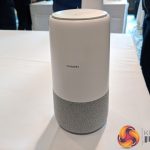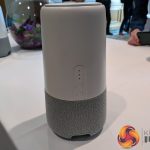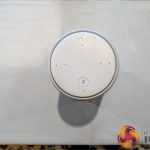Aside from unveiling the Mate 20 Lite, detailing its anticipated Kirin 980 and bolstering the colour choice of its P20 Pro range, Huawei took to IFA 2018 to launch its all-in-one AI Cube. While not technically a cube, the Google Home-inspired, Alexa-powered device acts as a Wi-Fi router, 4G modem and a premium smart speaker.
Considering Huawei is fairly late to the smart speaker game, it has quite the range of competition on its hands, from the established market leaders such as Google Home, Amazon Echo and Apple’s HomePod, to Samsung’s upcoming Galaxy Home smartspeaker. By combining a multitude of technology, Huawei states that the AI Cube represents a “new attitude to life” through a “seamless experience.”
Presumably modelled after Google’s Home device, Huawei kicks off a partnership with Amazon by including Alexa at its centre. While this grants the AI Cube 5,000 pre-established Alexa skills and counting, Huawei didn’t elaborate on how it would be differentiating the hub from other Alexa-powered devices. What it could tell us, however, was that it was already compatible with 20,00 different smart devices across 3,500 different brands, allowing the AI Cube to control an entire smart home from the tip of the user’s tongue.
The speaker itself is fairly modest in size, sporting a 15W mono speaker, a 400ml aluminium diaphragm and passive bass radiators to project its sound, backed by Huawei Histen. The firm dubbed its AI Cube as “more friendly” to the user’s home thanks to its aesthetic, although this is to be expected given that the device this echoes Google’s efforts thanks to its fabric covered speaker. On its flat top, near the on-board controls sits four far-field microphones for full 360-degree vocal coverage.
Considering the AI Cube sports dual-band 802.11ac Wi-Fi, its competition would be more in line with Netgear’s celebrated Orbi series with the newly unveiled Orbi Voice, similarly powered by Alexa. Huawei does go one step further though, by implementing Cat.6 4G cellular connectivity via SIM card, supporting up to 300Mbps. This can interestingly turn the AI Cube into a mobile wireless hub, offering its 4G connection to other devices, likely requiring a decent data plan. Lastly, Huawei couldn’t forget HiLink app support, allowing the user to configure and control these settings from their smartphone.
Huawei has remained rather vague with regards to its AI Cube, with intentions to reveal the device’s pricing when it launches before the end of the year. The firm has also revealed at least two variants that will be available upon launch, its default grey/white combination and a red/white version.
KitGuru Says: While I managed to hear a bit of the AI Cube’s sound quality, a packed room is not ideal for me to give a verdict on how it stacks up against competitors. Similarly, without knowing the price until the end of the year, it’s difficult to judge whether Huawei’s efforts show bang for the buck. Do you like the look of Huawei’s AI Cube?
 KitGuru KitGuru.net – Tech News | Hardware News | Hardware Reviews | IOS | Mobile | Gaming | Graphics Cards
KitGuru KitGuru.net – Tech News | Hardware News | Hardware Reviews | IOS | Mobile | Gaming | Graphics Cards





